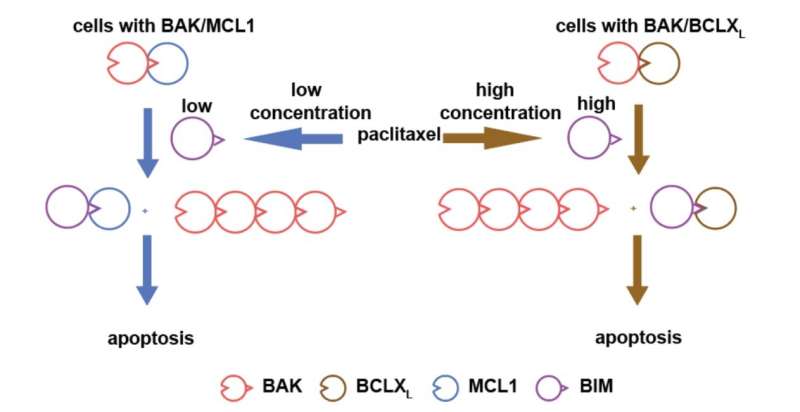BAK/MCL1 complexes can predict chemotherapy drugs sensitivity in cancer cells

A research team led by Prof. Dai Haiming from the Hefei Institutes of Physical Science (HFIPS) of the Chinese Academy of Sciences (CAS) recently announced the constitutive BAK/MCL1 complexes could predict chemotherapy drugs sensitivity of ovarian cancer. Result has been published in Cell Death & Disease.
According to the activation and interaction status of BAK in cell, the researchers found that the sensitivity of blood and lymphoma tumor cells to BH3 analogs could be predicted, so they took ovarian cancer as the research object, and analyzed the relationship between the state of BAK in tumor cells and the sensitivity of the tumor to traditional chemotherapeutics.
The incidence of ovarian cancer ranks third among gynecological tumors. Ovarian cancer is currently treated with traditional chemotherapeutics, including platinum drugs and paclitaxel, which are not very efficient, and the anti-tumor drug sensitivity prediction can effectively improve the quality of life or life cycle of patients. Currently, a variety of methods based on genetic genes, in vitro drug screening, and patient-derived xenograft (PDX) models have been applied to predict the susceptibility of anti-tumor drugs.
In this work, the researchers found that BAK/MCL1 complex in tumor cells can predict the sensitivity of paclitaxel, MCL1 inhibitors, and their combination. Further studies on PDX models and animal experiments also illustrate the predictive effect of the BAK/MCL1 complex.
More information: Dongyan Liu et al, Constitutive BAK/MCL1 complexes predict paclitaxel and S63845 sensitivity of ovarian cancer, Cell Death & Disease (2021). DOI: 10.1038/s41419-021-04073-0















